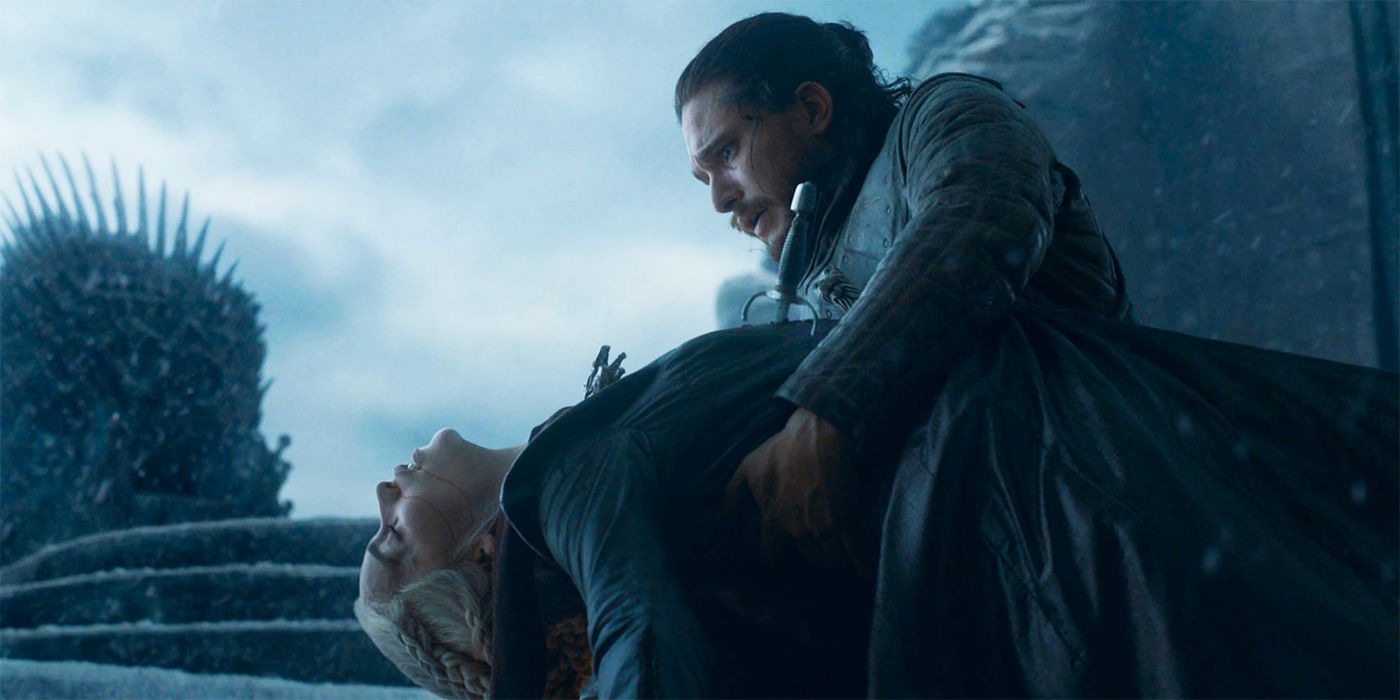
It’s ‘Game of Thrones’ that knew nothing, not Jon Snow.
Oh, Jon Snow. Watcher of the Wall, progenitor of memes, pouter of face. Kit Harington shot to fame as the recalcitrant bastard son of Ned Stark (Sean Bean) with a destined heritage more significant than anyone except internet message boards could have imagined, and Harington gave the Game of Thrones role his considerable talents. Millions were captivated by Jon’s persistence, temper, pretty boy angst, and courage on the battlefield. Despite being a self-proclaimed “the books were better” snob, this writer doesn’t begrudge non-readers who found themselves drawn into Jon’s orbit. He’s firmly ensconced within my top five favorite characters from George R. R. Martin’s A Song of Ice and Fire universe.
But, as a book fan, the inevitable “but” always comes with HBO’s sometimes miraculous and often troubled Game of Thrones, the fantasy epic with a series finale still ricocheting around the world. For Harington’s Jon Snow, the “but” is another case of oversimplification and inaccurate characterization that left a sour taste in readers’ mouths. In all fairness to showrunners David Benioff and D. B. Weiss (the fairness I can grant is microscopic), Jon suffers from a tricky conundrum. He’s a very internalized character. No television show or feature film can replicate a book character’s written perspective and mental insights. That, however, is when adaptations are called upon to solve the problem creatively. Game of Thrones didn’t bother, and in so doing lost their way with a flagship character. George R. R. Martin’s Jon Snow versus “Jon Show” is a volcanic landslide of embarrassment.
How Is Jon Snow Different in the ‘Game of Thrones’ Books?
At the beginning, there was little difference between the Jon Snow of the A Song of Ice and Fire novels and HBO’s “Jon Show.” Game of ThronesSeason 1 stayed impressively faithful to the first book, aside from some randomly mystifying and misguided choices. However, the longer Game of Thrones endured and the more its popularity grew, the farther the series strayed off script. There were signs of impending disaster before Benioff and Weiss ran out of Martin’s pre-written material. Within this hot mess, the characters suffered the worst damage. For all of Harington’s charisma and triumphant moments, the actor’s given little to work with that doesn’t misrepresent Jon into a spoiled brat or a perpetually morose grown man with stagnant character growth.

Certainly, book Jon has his fair share of personality hiccups. That’s the point. The social ostracization he faces as a bastard child carves a weighty chip into his shoulder. Jon is 14 years old when Game of Thrones begins, and he acts like a kid. He’s by turns scornful, aloof, sullen, navel-gazing, foolishly stubborn, a purposeful jerk, and sassy. (Yes, Jon Snow can joke!) His quickly inflamed temper activates whenever his fragile pride is hurt, which is often. True to a teenager, he has horrid communication skills, a three-fold problem stemming from his reserved nature, immaturity, and the ego he overindulges. His poor leadership gets him assassinated by his once-loyal men at the end of book five, A Dance with Dragons.
But his Night’s Watch brothers are remorseful as they murder their beloved and admired Lord Commander. Despite his inscrutable glowers and haughty isolation, Jon realizes his mistakes early on during his tenure with the Night’s Watch. He becomes a mentor, teacher, and friend to his Brothers, slowly and steadily maturing past that chip on his shoulder thanks to worldly experience. Part of what makes Jon so beloved is the relatability of his desires: he’s looking for purpose, identity, and a place to call home. In his heart of hearts, Jon Snow wants to be a good person. He also wants to be found worthwhile. He spent most of his childhood fantasizing about becoming an epic hero because that comes with praise. He even wanted to inherit Winterfell for a time, despite his love for his siblings. George R. R. Martin said in a 2017 interview with Meduza: “The character I’d want to be? Well, who wouldn’t want to be Jon Snow — the brooding, Byronic, romantic hero whom all the girls love.”
Jon Snow Is a Great Character, but He Isn’t the Hero
After 14 years of being an outsider, his last name an inescapable brand of damnation, Jon joining the Night’s Watch challenges his self-image. His arc is a journey of self-discovery, aiming to do the right thing and messing up frequently despite his best intentions. Who can’t relate to that? Contrary to popular opinion, post-Game of Thrones Seasons 7 and 8, Jon Snow isn’t boring in the slightest. There’s an undeniable charisma nestled within Martin’s writing. Because Jon’s been confined to the shadows, he’s quietly intelligent, keenly observant, and demonstrates intuitive strategic intelligence. He wins the respect and loyalty of his Brothers because he cares for his men.
He has no special talents besides warging, and no cute dragons to raise. He struggles with his torn loyalties between the Night’s Watch and his siblings, a conflict that results in his death. This is no King Arthur archetype common to the fantasy genre. Martin lives to subvert tropes, and Jon’s whetstone-sharp mind being his strength, not his sword, is intentional literary irony. These unique choices make for a more fascinating, refreshing, and ever-evolving character. As Maester Aemon said, “Kill the boy and let the man be born.”
Benioff and Weiss Weren’t Interested in the Magic of the Series
In comparison, “Jon Show” is truly, actually boring. Benioff and Weiss missed the memo about trope subversion and instead turned the intelligent boy into a blank-faced physical badass. It’s no fault of Kit Harington’s; much blame can be assigned to aging up the characters. Harington was in his mid-20s when Game of Thrones began, and it robs Jon’s maturation of its believable nuance. Likewise, Jon’s Season 6 resurrection leaves much to be desired. David Benioff and D.B. Weiss admitted to stripping Martin’s series of its fantasy elements because “[they] didn’t just want to appeal to that type of fan. They wanted to expand the fan base to people beyond the fantasy fan base to [mothers and NFL players]” — which is one of the silliest things I’ve ever heard.
In the novels, Catelyn Stark (Michelle Fairley) is risen from the dead but becomes a vengeful monster devoid of her original self. Such a mythology implies that resurrecting Jon will have lasting consequences. Cheating death comes at a dire cost in the A Song of Ice and Fire world. It’s all but a given the Jon Snow that readers love won’t be the same person when (or if) he returns. Aside from playing into shock value, Game of Thrones’ made Jon’s death as impactful as a sneeze.
HBO’s ‘Game of Thrones’ Failed Jon Snow
Jon’s importance to the wider Game of Thrones narrative is also overblown, which is pretty ironic. Fans have inspected Martin’s words with a fine-tooth comb for decades and theorized about the pivotal roles Jon and Daenerys Targaryen (Emilia Clarke) might play in saving Westeros from The Long Night. Yet Jon comes to dominate the series without no firm reason beyond “fan favorite,” only to then play no part in the Night King’s destruction. Because subverting expectations is better than delivering upon a foreshadowed narrative, right? (Wrong.)
To add insult to injury, Jon lacks character development in Seasons 7 and 8. Even his former personality vanished without a trace like Melisandre’s (Carice van Houten) shadow baby ate it for a snack. What does Jon Snow feel about his true parentage, his contested claim to the Iron Throne, or anything else that’s happened to him? HBO had no clue, so fans will never know. The mangled potential between Jon and Daenerys is a thing of legend in the same way that coming home to find out a sinkhole swallowed your house makes the local news.
Jon Snow assumed a life of his own thanks to Game of Thrones’ zeitgeist success. He evolved into a meme, a beloved figure, the icon behind the Battle of the Bastards, and one of the series’ greatest failures in an epic string of missteps and poor writing. HBO missed the forest for the trees despite having Martin’s blueprint in their hands. A fundamental misunderstanding of Martin’s narrative led to a Jon Snow that, despite his cultural reputation, was a cluster-mess of wasted potential and unrecognizable to book devotees. Suffice it to say we’re glad they passed on the spin-off.
